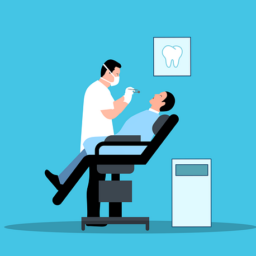
Doctor of Dental Surgery Degree (DDS) for Military and Veterans
According to Colgate.com, Doctor of Dental Surgery (DDS) and Doctor of Medicine in Dentistry (DMD) degrees "are the acronyms of the degrees dentists earn after finishing dental school. DDS means Doctor of Dental Surgery, and DMD can mean either Doctor of Medicine in Dentistry or Doctor of Dental Medicine."According to the American Dental Association, these degrees "represent the same education. Some universities may grant dental graduates with a DDS, and others grant a DMD, but both degrees have the same requirements."
According to the ADA, the Baltimore College of Dental Surgery established the first Doctor of Dental Surgery degrees in 1840. When Harvard University started its dental school in 1867, their degrees were called Dentariae Medicinae Doctorate (Doctor of Medicine in Dentistry) because Harvard uses Latin names for their degrees.
A Dentistry Degree is known as a Doctor of Dental Surgery (DDS) or Doctor of Dental Medicine (DMD) and is a graduate degree for preparing students to become licensed dentists. A DDS or DMD spans four years and focuses on oral health, dental anatomy, dental diseases diagnosis and treatment, patient care, and procedures such as fillings, crowns, bridges, and extractions.
After a Dentistry Degree, further training is required for specific modalities, such as Pediatric Dentistry. Students can also get degrees in Dental Clinical Sciences, Dental Public Health and Education and Dental Assisting, among others.
Associate’s and Bachelor’s Degrees are also available for dental hygienists, lab techs and assistants.
What can you do with a Dentistry Degree?
Students with a Dentistry Degree can take various paths in oral health and dental care. They can become general dentists who provide routine check-ups, cleanings, and treatments like fillings, crowns, and root canals.Some dentists also work in academia, research, public health, dental education, and dental tech, among other fields. Others may specialize in the following fields:
- Orthodontics: Correcting teeth and jaw alignment
- Periodontics: Treating gum diseases and conditions
- Oral surgery: Performing complex dental surgeries
- Pediatric dentistry: Caring for children's dental health
- Prosthodontics: creating dentures and implants
- Endodontistry: Treating tooth diseases and conditions
GI BIll and Yellow Ribbon Program Options for Degrees in Dentistry
Below is our list of GI Bill participating schools. Remember to explore your other military financial aid and veteran student financial aid opportunities.Military spouses who need scholarships and other financial aid can also receive help. Those looking for portable careers should ask about MyCAA options for a dentistry-related degree program.
Filters
Search and select multiple degree level.
Search and select multiple area of focus.
Religious Affiliation
Is a Dentistry Degree hard?
Dentistry is not an easy major; students need to complete an undergraduate degree before getting a Dentistry Degree. Common pre-dentistry majors are typically science-based and include biology, chemistry, biochemistry, math or other related fields.To enter a U.S. dental school, students must take a Dental Admissions Test (DAT). Students will then go through four years of graduate school in general dentistry.
They may attend between two to four years of schooling afterward if they have a specific focus. Students often become dental residents during that time—in general, dentistry residencies are typically one-year programs with the option of a second year.
Is a Dentistry Degree worth it?
Dental school can be expensive, but having a Dental Degree opens students up for lucrative and long-lasting careers. According to the U.S. Bureau of Labor Statistics, the occupation will grow 4 percent by 2032, with about 5100 job openings projected per year. Dental hygienist jobs are also expected to grow by seven percent during that time with 2032, with 16,400 openings projected per year.What you can make with a Dental Degree
The BLS states that a person working as a Dentist can make $159,530 annually. Dental specialists can make even more, according to Zip Recruiter:- Endodontists: $241,185
- Pediatric Dentists: $236,464
- Orthodontists: $309,402
- Prosthodontists: $330,066
- Oral And Maxillofacial Surgeons: $368,879
$84,860 annually.
Select VA-Approved Colleges and Yellow Ribbon Schools with Dentistry Programs
University of Kentucky - The University of Kentucky offers a Master’s Degree in Dental Client Sciences. The school has GI Bill®-approved programs, offers credit for military experience, is approved for Tuition Assistance, and awards credit for CLEP and DSST exams.
Harvard University -Harvard University offers a Master’s Degree in Dental Public Health and Education, has GI Bill-approved programs, and is approved for Tuition Assistance. It is a Yellow Ribbon school.
Alamo Colleges District - Alamo Colleges District offers associate’s degrees in dental assistance and laboratory technology. It has GI Bill-approved programs, offers credit for military experience, is approved for Tuition Assistance, and awards credit for the CLEP exam. Alamo Colleges District is a MyCAA-approved school.
University of Louisville - The University of Louisville offers a Bachelor’s Degree in Dental Hygiene and a Master’s Degree in Dental Client Sciences. Concorde Career College has GI Bill-approved programs, offers credit for military experience, awards credit for CLEP and DSST exams, and is approved for Tuition Assistance. The University of Louisville is a MyCAA-approved Yellow Ribbon school.
*Average annual salaries adapted and calculated from the U.S. Bureau of Labor Statistics National Occupational Employment and Wage Estimates. For more information, click here.






